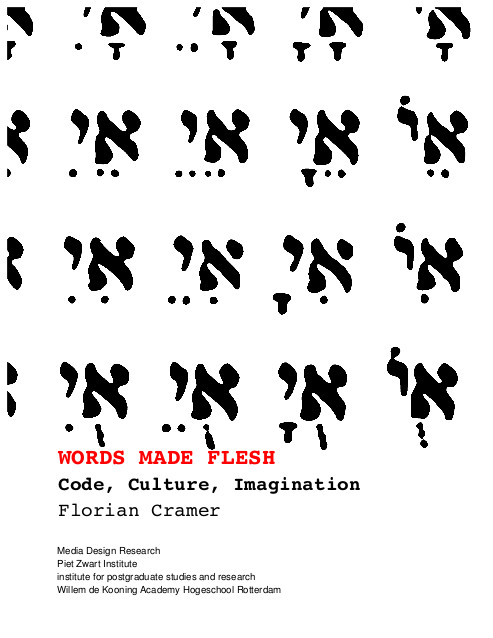Florian Cramer: Exe.cut(up)able statements: Poetische Kalküle und Phantasmen des selbstausführenden Texts (2011) [German]
Filed under book | Tags: · aesthetics, algorithm, avant-garde, code, code poetry, experimental literature, history of literature, information aesthetics, kabbalah, literature, net art, poetry, software, text, theory

“From the antiquity to today, there has been poetry that literally performs computations, processing its own letters. Prototyped by magic and Pythagorean mathematical aesthetics, it encompasses such diverse forms as kabbalist and Lullist language combinatorics, word permutation poetry, ludistic poetry, computational text collage, aleatoric, stochastic and recursive texts, Oulipian constraints, computer-generative literature, poetry in programming languages, and codeworks. Just like visual and sound poetry poetize the graphetic and phonetic dimensions of words, these writings show that computation is a dimension of language. On top of that, their poetics is rife with speculative and contradictory programs: often one and the same text form is at once being instrumentalized for total art and anti-art, mysticism and technicism, order and chaos. This has resulted in a fantastic literature whose speculative imagination manifests itself in the arrangement of letters rather than the semantics of the text. The book includes close readings of a 17th century sonnet (Quirinus Kuhlmann’s “XLI. Libes-kuss”), a 20th century musical composition (Alvin Lucier’s “I am sitting in a room”) and a 21st century net.art codework (mez breeze’s “_Viro.Logic Condition][ing][ 1.1_”), and discusses limitations of existing literary and media theory for criticism of these works.
A shorter, less scholarly English-language mutant of this book has been electronically published in 2005 as Words Made Flesh: Code, Culture, Imagination.”
Publisher Wilhelm Fink Verlag, October 2011
343 pages
Note: the book has just become free for Open Access publishing and is offered here for download in its manuscript version, licensed under Creative Commons Attribution Unported 3.0.
Comment (0)Bogumiła Suwara, Zuzana Husárová (eds.): V sieti strednej Európy: nielen o elektronickej literatúre: (2012) [Slovak, Czech]
Filed under book | Tags: · central europe, computer games, digital text, electronic literature, experimental literature, hypermedia, internet, literature, networks, poetry, text, theory, writing

(EN) This international collective monograph brings an understanding of the problematic of changes in artistic communication in the context of the cultural practices of the post-digital era and simultaneously asks new questions about it. This book presents the keystones of electronic literature research that are based, among others, on the digital character of the text, on multisensory reading, playfulness, hypermediality, experimentation and Internet communication. Its aim is also to map digital literature in the cultural environment of Central Europe. Researchers from Slovakia, The Czech Republic, Poland, Slovenia and Croatia collaborated on the publication. The monograph is a printed textual tapestry of various approaches, theories and perspectives that communicate among themselves, react to each other and together clarify the structure that literature personifies in the new media realm.
(SK) Kolektívna monografia prináša nové poznatky a zároveň kladie otázky o problematike zmien v umeleckej komunikácii v kontexte kultúry post-digitálnej doby. Prezentuje piliere výskumu elektronickej literatúry, ktoré okrem iného stoja na digitálnej podstate textu, na multisenzorickom čítaní, hravosti a hypermedialite, experimente a internetovej komunikácii. Cieľom je zároveň zmapovať recepciu digitálnej literatúry v kultúrnom prostredí strednej Európy. Na publikácii participovali bádatelia zo Slovenska, Čiech, Poľska, Slovinska a Chorvátska. Monografia je tlačenou textovou sieťou rôznych prístupov, teórií a hľadísk, ktoré vzájomne komunikujú, reagujú a spoločne dospievajú k osvetleniu štruktúry, ktorú literatúra v novo-mediálnom prostredí zosobňuje.
Contributions by Zuzana Husárová, Jana Kuzmíková, Gabriela Magová, Mira Nabělková, Andrzej Pająk, Katarina Peović Vuković, Mariusz Pisarski, Michal Rehúš a Jaroslav Šrank, Janez Strehovec, Bogumiła Suwara, Jaroslav Švelch
Publisher: SAP & Ústav svetovej literatúry SAV, Bratislava, 2012
Design and cover: Katarína Gatialová
ISBN 9788080950767
312 pages
Quo vadis elektronická kultúra? (a series of activities around the publication, Bratislava, 26-27 September 2012)
PDF (updated on 2012-9-25)
EPUB (updated on 2012-9-25)
Florian Cramer: Words Made Flesh: Code, Culture, Imagination (2005)
Filed under book | Tags: · art, art history, code, code poetry, computation, experimental literature, kabbalah, language, literature, philosophy, poetry, religion, software, software art, technology

“Executable code existed centuries before the invention of the computer in magic, Kabbalah, musical composition and experimental poetry. These practices are often neglected as a historical pretext of contemporary software culture and electronic arts. Above all, they link computations to a vast speculative imagination that encompasses art, language, technology, philosophy and religion. These speculations in turn inscribe themselves into the technology. Since even the most simple formalism requires symbols with which it can be expressed, and symbols have cultural connotations, any code is loaded with meaning. This booklet writes a small cultural history of imaginative computation, reconstructing both the obsessive persistence and contradictory mutations of the phantasm that symbols turn physical, and words are made flesh.”
Editor: Matthew Fuller, additional corrections: T. Peal
Published within Media Design Research programme, Piet Zwart Institute, Willem de Kooning Academy Hogeschool, Rotterdam
GNU General Public License 2; GNU Free Documentation License 1.2; Creative Commons Attribution-ShareAlike License 2.0
141 pages
Review: Tomáš Javůrek (Joinme, 2018, CZ).
PDF (updated on 2012-10-11)
HTML (added on 2013-7-1)
Sequel: Exe.cut(up)able statements: Poetische Kalküle und Phantasmen des selbstausführenden Texts (2011, in German).
Comment (0)
